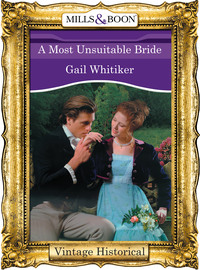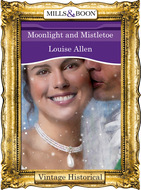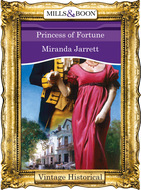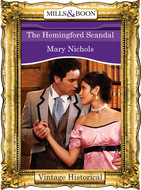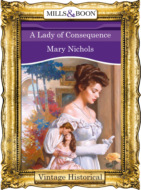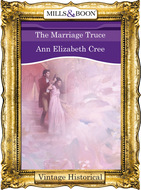Kitap dosya olarak indirilemez ancak uygulamamız üzerinden veya online olarak web sitemizden okunabilir.
Kitabı oku: «A Most Unsuitable Bride», sayfa 2
Chapter Two
I n the overall scheme of things, Edward Thurlow, Earl of Garthdale, was not unhappy with his life. Born into a situation most would have envied, he had inherited not only the title upon his father’s death, but the extensive lands and wealth that went with it. He enjoyed good health and a wide circle of friends, and a family situation that was, for the most part, agreeable.
He had two sisters, the elder of whom, Barbara, was happily married and soon to bear her second child, and a younger one, Ellen, who had been keeping company with a titled gentleman, who was said to be on the verge of proposing marriage. The only blot on his otherwise happy life, Edward acknowledged, was his mother.
His father, God rest his soul, had died four and a half years ago, and while the rest of the family had come to terms with his passing, his mother quite simply had not. She had stubbornly refused to move on with her life, and had become more fretful and cynical as the months went on. She had taken to complaining bitterly about a variety of physical aches and pains that suddenly seemed to have afflicted her, and as a result, was often to be found in bed, bemoaning the fact that no one truly understood what she suffered.
Edward wasn’t surprised that many of her friends had stopped calling. Moreover, he suspected that the ailments from which she suffered were strictly a means of drawing attention her way, since it was clear that her need for her family had increased as dramatically as theirs for her had decreased.
Unfortunately, there was nothing he could do about that. He was hardly in need of a mother’s care, nor was Barbara, who had a family of her own to look after. And given that the servants effectively saw to the running of the house, it fell to Ellen to bear the brunt of their mother’s persistent attentions. The fact that her younger daughter might soon be engaged did nothing to prevent Lady Garthdale from clucking over her like a mother hen over her chick, which, at times, Edward supposed to be an apt comparison since, at times, Ellen seemed to possess no more sense than one.
Still, she was a sweet-natured child, deserving of happiness and anxious for a home of her own, and Edward was happy to see her courted by a man of wealth and position. Besides, once they were married, his obligation to her came to an end and he would be free to turn his attention to his own future and marital plans.
Not that he had any plans, Edward admitted as he trotted Titan, his large bay hunter, through the early morning quiet of the park. He had managed to reach the age of six and thirty without having been caught in the parson’s mousetrap, but he knew it wasn’t a situation that could go on forever. It fell to him to ensure the continuation of the line, and until now, he hadn’t given that particular obligation much thought. However, with Ellen all but settled, and his mother unlikely to produce another heir, he no longer had a choice. He had to take a wife.
The question was, who? Certainly, there was a long enough list of eligible young ladies from which to choose. His mother frequently rhymed their names off to him, and of late even Barbara had begun introducing the subject of which innocent young miss might be best suited to the role of Countess of Garthdale.
The problem was, Edward didn’t want an innocent young miss for a wife. He wanted a woman of character; a woman with whom he had something in common, and with whom he could have stimulating conversations. One who possessed the intelligence and sharpness of mind to have informed thoughts and opinions of her own.
Was that so shocking?
His friends seemed to think so, particularly those who wanted to marry attractive, well-dowered girls who would present them with sons and then leave them to pursue their own interests. But Edward couldn’t imagine a more dismal prospect. He could not imagine spending the rest of his life with a woman who did not at least share some of his interests, particularly those that related to politics or commerce.
To him, the idea seemed more purgatory than pleasure.
It was true, he would never be called upon to make his living from the land, or to forge his way in business, but as a member of the House of Lords, surely it behoved him to learn all he could about the factors affecting the British economy.
Closer to home, he wanted to be able to talk to someone other than his land steward or secretary about the state of the home farm and the welfare of his tenants. He wanted to be able to discuss such things with his wife. Unfortunately, other than Barbara, Edward had met very few women who showed an interest in anything beyond the latest copy of La Belle Assemblée.
His father had understood his desire to marry a woman of sound mind, perhaps because his father had had the misfortune to be married to one who hadn’t. Oh, he’d loved her well enough, Edward supposed, but he doubted his parents had shared anything beyond the most basic of interests. He could not imagine his mother stimulating his father in any way, and he thought that a sad commentary on two people who had lived under the same roof for nearly forty years.
Perhaps such mismatches were the fault of society, Edward reflected as he eased Titan to a walk. The necessity of marrying well was often more important than marrying for love, and blushing young women were shot out into the social world for a flock of eager young men to look over, with all the objectivity of farmers selecting brood mares. Appearance was everything, followed closely by good bloodlines and careful upbringing. Those ladies fortunate enough to be blessed with all three would be chosen first, and those even more fortunate would make a marriage with a man who loved and respected them. The rest would settle for a pretence of love and make of it what they could.
Edward didn’t like settling and he didn’t like pretence. He didn’t like the idea of choosing a wife based solely on the strength of a few polite and rigidly supervised meetings. After all, what did a man really know about the woman he intended to marry? All ladies appeared poised and polished on first meeting. They all smiled and danced, and sang pretty songs and played the piano, but what did a man really know about the inner workings of such a woman? Was she a lady in public and a shrew in private? Did she evidence a sparkling wit, only to fall victim to vapours when no one was around?
And what about sex? Now there was a subject rife with the potential for disaster. What if his wife turned out to be one of those frigid creatures who did her duty in bed but derived no pleasure from it? How did a man go about pleasing a woman who shuddered at the very thought of intimacy?
Edward was so deep in thought that it was a few moments before he realised that someone was approaching on horseback. He looked up, and to his surprise, saw an elegant lady seated atop a fine dapple-grey mare. She was accompanied by a groom, but because it was so early in the day, Edward felt a mild stirring of interest. Most females of his acquaintance didn’t even leave their beds before noon, yet this one was dressed and riding in the park at barely half past seven. That in itself gave the suggestion of someone out of the ordinary.
His gaze sharpened as he noticed other things about her: the flattering cut of her mulberry-coloured habit, and the quality of the lace trim. Her bonnet was most dashing, but the unusually heavy veil descending from it made it all but impossible to discern her features, though her figure looked to be that of a young woman—and one who was obviously at ease in the saddle. She held the reins firmly between gloved fingers and gave no impression of being nervous or ill at ease, even though the mare had her ears pricked forward and looked to be skittish.
Edward knew she would have ridden by him had it not been for the cat, a scrawny creature only a few months old that chose that very moment to dart out from the foliage at the base of a tree and run right between the mare’s front feet.
Startled, the grey reared.
The lady, not expecting the movement, uttered a soft gasp, and Edward, fearing that she would fall, immediately pushed Titan forward.
The cat, having surely expended one of its nine lives, scampered unharmed into the bushes.
‘Are you all right?” Edward called, wondering if he should make a grab for the mare’s reins.
‘I am…fine, sir, thank you, but it would seem that…Juliet is not so easy of mind.’ The lady’s voice was unusually low and husky, but there was no trace of panic in it. ‘I hope she did not tread on the poor cat.’
‘Rest assured, it escaped with nary a hair flattened. And even had it not, it was more your welfare I was concerned with,’ Edward told her.
‘It is good of you to be concerned, but as you can see I am fine. I suspect the unexpected arrival of both cat and hunter momentarily proved too much for Juliet,’ the lady said, adroitly regaining control of the dancing mare.
‘Thankfully, it did not prove too much for you,’ Edward observed, backing Titan away. ‘Is your mare always so high spirited?’
‘I have no idea.’ The lady patted the grey’s neck with affection. ‘This is my first time riding her, but knowing to whom she belongs, I suspect she was merely in need of exercise. I thought a few times around the park would be a good start.’
Edward couldn’t remember having heard a voice as husky as hers before, but finding it excessively attractive, decided he wanted to hear more. He also wondered if there was a polite way of asking her to lift her veil. He was suddenly very curious to see her face. ‘Do you ride often in the morning? I don’t believe I’ve seen you in the park before.’
‘I am newly arrived in London, but ride when I can, and prefer the morning when there are fewer people about.’
‘My sentiments exactly. There is nothing more tedious than trying to enjoy the air when one is squeezed cheek to jowl with others intent on doing the same. Perhaps we might ride together and thereby help to relieve the congestion?’
It was a casual remark, lightly offered, perhaps even spoken in jest. Nevertheless, it came as something of a surprise to Edward, who wasn’t in the habit of extending invitations to women with whom he was not acquainted. Nor, it seemed, was the lady used to accepting them. ‘Thank you, sir, but I do not think that would be wise.’
‘Of course.’ Edward already regretted having asked. ‘I spoke out of turn. You obviously have a husband or brother at home who would object to such an arrangement.’
‘On the contrary, I have neither husband nor brother, but my stay in town is of short duration and after that I shall be returning to the country.’
It was not the answer Edward had been expecting. ‘Still, that shouldn’t preclude us from riding together while you are here,’ he said, wondering at his need to persist. ‘You did say you intended to ride, and, since we both prefer the morning, why should we not ride together?’
‘Because it would be difficult to plan such outings when I cannot commit to riding at the same time each day. I prefer the mornings, but go out when my aunt or cousin do not require my services.’
Her services? Edward frowned. Was she a companion then? A poor relation dependant upon a rich family member to ease her way?
He glanced at her outfit again and thought it unlikely. A poor relation would not be permitted such elegant clothes, nor be given so fine a horse to ride. ‘Forgive me, but in the absence of someone to perform the niceties, may I ask your name?’
‘You may ask, sir, but at the risk of sounding rude, I think I shall decline.’
‘You would deny me so simple a request?’
‘Yes, because you would not have asked had our circumstances been different.’
‘What circumstances?’
‘Those imposed by an impulsive feline who dashed out and startled my horse, thereby forcing you to offer assistance.’
‘I was not forced to offer it,’ Edward said, stung that she would think him so cavalier. ‘I was happy to do so.’
‘And it was very good of you, and I do hope I have expressed my thanks in a way that leaves you in no doubt as to my sincerity. But given the circumstances, I think it would be best if we were to leave it at that. Good morning.’
And with that, she pressed her heels into the mare’s side and rode on.
Edward watched her go, aware of having been slighted, albeit politely, by a lady who obviously wished to have nothing to do with him—equally aware that he couldn’t remember the last time a lady had done that to him…especially one who claimed to be single. She hadn’t offered her name, nor had she enquired after his. In fact, nothing in the way she had behaved had led him to believe that she knew him, or wished to. And as a man used to being the object of intense feminine scrutiny, Edward found it a new and intriguing experience.
True, his impulsive invitation to have her ride with him had come as a surprise, even to him, but in hindsight, Edward realised it had more to do with finding out who she was than anything else. Anonymity always intrigued him, and, as a man who liked to have answers, her continued resistance had sparked more than a passing interest.
Not to mention that she had the most seductive voice he’d heard in a very long time.
The lady’s groom tipped his hat to Edward as he rode by, and, not thinking, Edward acknowledged the salute. Regrettably, it wasn’t until the servant was too far past that he realised he should have asked the fellow his mistress’s name. It might not be the accepted method of gaining an introduction, but when it was the only one available, why should he not make use of it?
Still, if the lady had ridden this morning, chances were good she would ride again. If not today or tomorrow, certainly before the end of the week. And since he rode every day, and more than once if he could, it was only a matter of time before their paths crossed again.
And in matters like this, patience was something Edward had in abundance.
Diana returned to George Street and changed into a round gown of sprigged muslin. After smoothing a few errant curls back into place, she draped a warm shawl over her shoulders and headed downstairs for breakfast.
She was still feeling chilled from the onset of a cold, and though the wretched soreness in her throat had eased somewhat, her voice was still much deeper than usual. But she was glad she had gone ahead with her ride. She had woken to her first morning in London feeling heavy in body and anxious in mind, and because she had put both down to the uncertainty of what lay ahead, she had decided to venture out on horseback. She rode every morning at home, and getting out into the fresh air always seemed to help improve her spirits.
Unfortunately, it wasn’t until she had entered Hyde Park that Diana realised the lethargy she had been feeling was more physical than mental, and that while an invigorating ride might help improve her mood, it probably wouldn’t do much for her health. Her throat had felt as though it was on fire, so that every time she swallowed, she’d winced in pain. Nor had it made for easy conversation. Diana had hardly recognised the deep, husky voice as her own. She couldn’t help but wonder what Lord Garthdale had thought of it.
Oh, yes, she knew who he was. Thanks to her aunt’s groom, she knew not only who he was, but where he lived and who his family were. The strange part was, Diana couldn’t recall having met the Earl of Garthdale before, nor could she remember her aunt having spoken about him. That in itself was curious, since her aunt had taken great pains to point out every eligible gentleman the last time Diana had been in London, particularly those who were handsome, titled or in possession of a large fortune.
Lord Garthdale was all three. Part of the reason Diana had been paying so little attention to her mare was as a result of admiring the dashing looks of the gentleman riding towards her. Even his voice had been pleasing; neither the affected drawl of the dandy, nor the clipped tones of the aristocrat. It had been a rich, resonant sound that had fallen most pleasantly on her ear.
Yes, all in all, it had been an interesting encounter, Diana reflected as she made her way to the breakfast parlour. If only he hadn’t asked for her name, and whether or not she was married—
‘Ah, good morning, my dear,’ Mrs Mitchell said, looking up as Diana entered. ‘I didn’t expect to see you back so soon. Did you enjoy your ride?’
‘Very much, Aunt,’ Diana said, happy to be diverted from her thoughts. ‘Juliet suits me very well.’
‘I thought she might. I feared her being a bit rambunctious to start, as she’s not had much exercise of late, but I knew that wouldn’t be a problem for you. You have your mother’s skill when it comes to riding. But, my poor girl, whatever has happened to your voice?’
Diana grimaced. ‘I wish I knew. I woke up feeling rather muzzy this morning.’
‘Yet you still went riding?’
‘I thought it might help.’
‘Obviously it did not.’
Diana picked up a plate. ‘It did clear my head a little, but I fear it has done nothing for my throat.’
‘Probably this vile London air,’ Mrs Mitchell said as Diana perused the array of dishes set out on the sideboard. ‘I always notice it when I return from the country. But I do hope it clears up soon. You have such a lovely clear voice, and it is all but unrecognisable now.’
‘I’m sure I shall be fine in a day or two.’ Not feeling particularly hungry and wanting something easy on her throat, Diana helped herself to a small portion of eggs. ‘So, what have you planned for Phoebe’s first day in London?’
‘Oh, there are several things we have to do. The child will certainly need clothes, and I suspect you will, too. I doubt you’ve had anything new made up during the last four years.’
Diana lifted her shoulders. ‘I had no need of new gowns. Those I had were sufficient for my purposes.’
‘Sufficient for the country, perhaps, but not for going about in London now,’ Mrs Mitchell said. ‘Fashions change by the month, Diana, never mind by the year, and I won’t have you looking like a country mouse when you set foot in society again. You are far too lovely for that. So, we shall call on Madame Claremont and make her a happy woman, then we shall go to the stationers for cards. After that, we shall visit the jewellers. I am having my old pearl necklace reset for Phoebe. She’s always admired it, and pearls are eminently suitable for a young girl entering society.’
‘Speaking of society, I met an interesting gentleman in the park this morning,’ Diana said, having decided, after much thought, to share news of the encounter with her aunt.
‘Really? Did he tell you his name?’
‘No, but your groom did.’
Mrs Mitchell laughed. ‘Of course. Tupper knows everyone, and everything about them. Well, who was he?’
‘Lord Garthdale.’
‘Lord Garthdale!’ Mrs Mitchell nearly dropped her fork. ‘Good heavens!’
Diana glanced up in amusement. ‘Why so surprised, Aunt? Do not most gentlemen ride in Hyde Park in the morning?’
‘Well, yes, but Lord Garthdale is hardly like most men! Apart from being one of the most eligible gentlemen in London, he is also one of the most elusive. He rarely attends society events, and, when he does, he seldom offers encouragement to any of the young ladies present. Still, he is a handsome gentleman, is he not?’
‘I thought him very handsome indeed, and extremely gallant,’ Diana admitted, explaining how the mare had shied and how Lord Garthdale had come to her aid.
‘Obviously he didn’t realise how little you were in need of it,’ Mrs Mitchell said, chuckling. ‘But I’m surprised he did not ride off immediately after seeing Juliet settled, for that would certainly have been more his style. Did he enquire after your name?’
‘He did, but I did not make it known to him. I feared he might recognise it.’
‘And what if he did?’ Mrs Mitchell said. ‘Your life isn’t over because you refused to marry Lord Durling.’
‘It would be if Lord Durling had his way.’
‘Nonsense. The man went on with his life. Why should you not go on with yours?’
‘Because I am the one who jilted him, Aunt Isabel, and I doubt he has forgiven me for it,’ Diana said. ‘Remember how angry he was at the time? Remember all the hateful things he said? He did everything he could to ruin my reputation and to make me look guilty.’
‘Well of course he would try to make you look guilty. The man has an enormous ego, and since you were the one who refused to go through with the marriage, he had to make it sound as though your reasons for rejecting him were entirely self-serving.
We know they were not, of course, but no one else did. And by not saying anything, you allowed society to draw their own conclusions.’
‘You know why I refused to say anything,’ Diana mumbled.
‘Yes, I do, though I still think you were wrong. I’m sure that if you had spoken to someone in authority—’
‘Lord Durling is a member of the House of Lords!’
‘Be that as it may, he is not above the law.’
‘He is beyond reproach in the eyes of society,’ Diana said. ‘And because we must concern ourselves with Phoebe making a good impression on society, we cannot afford to be careless.’
‘But Diana, it has been four years.’
‘I know. But I do not trust Lord Durling any more now than I did then,’ Diana said quietly. ‘He is a man who holds a grudge and I would not put it past him to try to make trouble for Phoebe if he thought it might be a way of striking back at me.’
‘Which is why I wish you would tell people the truth of the matter,’ Mrs Mitchell said in exasperation. ‘The man struck you, Diana. He raised his hand without thought or provocation, and dealt you a blow hard enough to knock you to the ground. As far as I am concerned, such behaviour is unpardonable. Any man who would treat a lady like that deserves to be exposed for the wicked creature he is!’
‘And I don’t disagree with you, Aunt, but who would believe me if I were to tell them?’ Diana said. ‘It would always be my word against his, and society is hardly like to rally behind me. Lord Durling is a respected member of the aristocracy and an extremely charming man.’
On the outside, Diana reminded herself. On the inside, it was a very different matter.
‘Well, I shall respect your wishes, just as I did four years ago, but that doesn’t mean I agree with them,’ Mrs Mitchell said tersely. ‘Lord knows, I would take issue with the man myself, but, like you, I cannot suppose to trust him, and I should hate to see his vindictiveness turned against Phoebe.’
Diana returned her attention to her breakfast. ‘Exactly. Lord Durling effectively destroyed my reputation when I refused to marry him, and I must do everything I can to guard Phoebe’s against him. But now we must say no more about it for I hear her coming.’
Nothing more was said over breakfast, and the rest of the meal passed in amiable chatter about new gowns, current fashions and upcoming events. But as the three ladies set off for the shops, Diana couldn’t help but wonder if she should have stayed in Whitley and let Phoebe come on her own. After all, she had no reason to be here, other than to keep her aunt and cousin company, and, in truth, both of them had friends enough to do that.
Had her returning to London with Phoebe now been a terrible mistake?
